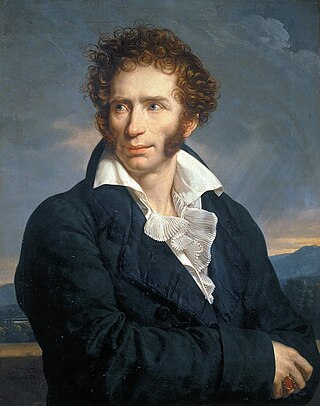Ugo Foscolo
Italian writer and poet (1778–1827) From Wikipedia, the free encyclopedia
Remove ads
Ugo Foscolo (Italian pronunciation: [ˈuːɡo ˈfoskolo]; 6 February 1778 – 10 September 1827), born Niccolò Foscolo ([nikkoˈlɔ ˈfoskolo]), was a Greek-Italian poet, writer, playwright, and revolutionary.[1][2]
Foscolo was a Neoclassicist, Pre-Romantic author.[1]
Remove ads
Early life
Foscolo was born on 6 February 1778 in Zakynthos (Zante), Republic of Venice (now Greece), from the Venetian doctor Andrea Foscolo and the Greek Diamantina Spathis.[1] His birth name was "Niccolò", just like his paternal grandfather's (his father's father), but he wanted to be called "Ugo" instead.[1]
Works
Poetry
- Ai novelli repubblicani, ode (1797)
- A Bonaparte liberatore [To Bonaparte the liberator], ode (1797)
- A Luigia Pallavicini caduta da cavallo [To Luigia Pallavicini fallen from a horse], ode (1800)
- All'amica risanata [To the healed (female) friend], ode (1802)
- Non son chi fui, perì di noi gran parte, sonnet (1802)
- Che stai?, sonnet (1802)
- Te nudrice alle Muse, sonnet (1802)
- E tu ne' carmi avrai perenne vita, sonnet (1802)
- Perché taccia il rumor di mia catena, sonnet (1802)
- Così gl'interi giorni in lungo incerto, sonnet (1802)
- Meritamente, però ch'io potei, sonnet (1802)
- Solcata ho fronte, sonnet (1802)
- Alla sera [To the night (evening)], sonnet (1803)
- A Zacinto [To Zakinthos], sonnet (1803)
- Alla Musa [To the Muse], sonnet (1803)
- In morte del fratello Giovanni [In death of brother John], sonnet (1803)
- Dei Sepolcri [Of the Sepulchres], carmen (1807)
- Delle Grazie [Of the Graces], short poem (1803–1827, unfinished)
Novels
- Sesto tomo dell'io (1799–1801)
- Ultime lettere di Jacopo Ortis [The last letters of Jacopo Ortis] (1802)
Plays
- Tieste [Thyestes] (1797)
- Ajace [Ajax] (1811)
- Ricciarda (1813)
Remove ads
References
Other websites
Wikiwand - on
Seamless Wikipedia browsing. On steroids.
Remove ads


